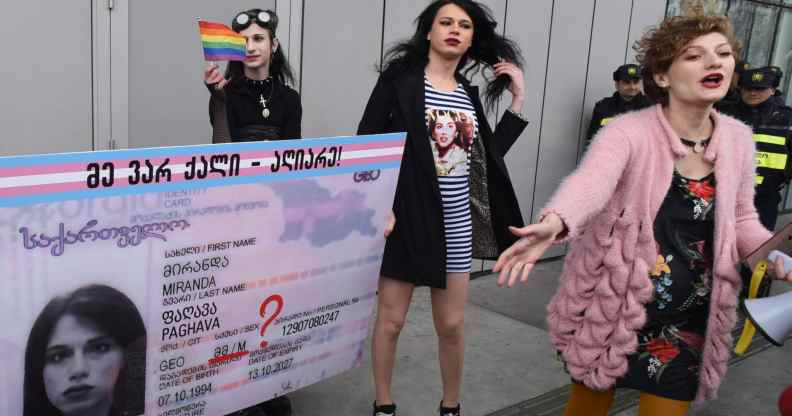Deeply conservative country of Georgia gives trans woman legal recognition for the first time

LGBT+ activists in Georgia hold a giant ID card of a trans woman seeking to change her legal gender status on International Women’s Day in 2018 (Ano Shlamov/Getty)
The deeply conservative country of Georgia has legally recognised a trans woman’s gender identity for the first time ever.
On 25 March the Ministry of Justice of Georgia granted a trans woman’s request to change her legal gender status to female. Her birth certificate was also reissued by the authorities, setting a huge precedent for the country.
The historic milestone was first reported by Open Democracy and the Georgian women’s rights group WISG, which said the woman had submitted a medical certificate confirming she had undergone gender-affirming surgery.
WISG noted that, despite this groundbreaking case, Georgia still lacks adequate legislation for transgender people.
Trans people who don’t want to undergo bottom surgery or other invasive medical procedures are barred from having their gender recognised, and the huge costs of this surgery are not covered by the national health service.
In 2017, two transgender men filed a suit against the country at the European Court of Human Rights after authorities refused to change their gender status in official documents unless they underwent surgery.
That court case, which is being litigated by WISG and the European Human Rights Advocacy Centre, a London-based rights group, is still pending.
The issue of legal gender recognition has been repeatedly raised in recent years amid a climate of intense homophobia and transphobia.
When the capital of Tbilisi attempted to host the country’s first Pride in 2019 the parade had to be cancelled after an anti-gay millionaire rallied homophobes to bring wooden clubs.
And last year a trans woman set herself on fire to highlight the injustices faced by her community. “I am a transgender woman, and I’m setting myself on fire because the Georgian state doesn’t care about me,” she shouted to bystanders.
Months earlier, WISG had issued a statement highlighting how trans women in Georgia are being impacted by the coronavirus pandemic.
The group urged the government: “Consider women engaged in sex work, especially transgender women, as a group of special needs and help them according to their needs, for most of them lack moral and financial support from their own families.
“Furthermore, many of them live on rent, which they are unable to cover and they cannot afford to meet their basic needs in social distancing conditions due to the specificity of their work.”

